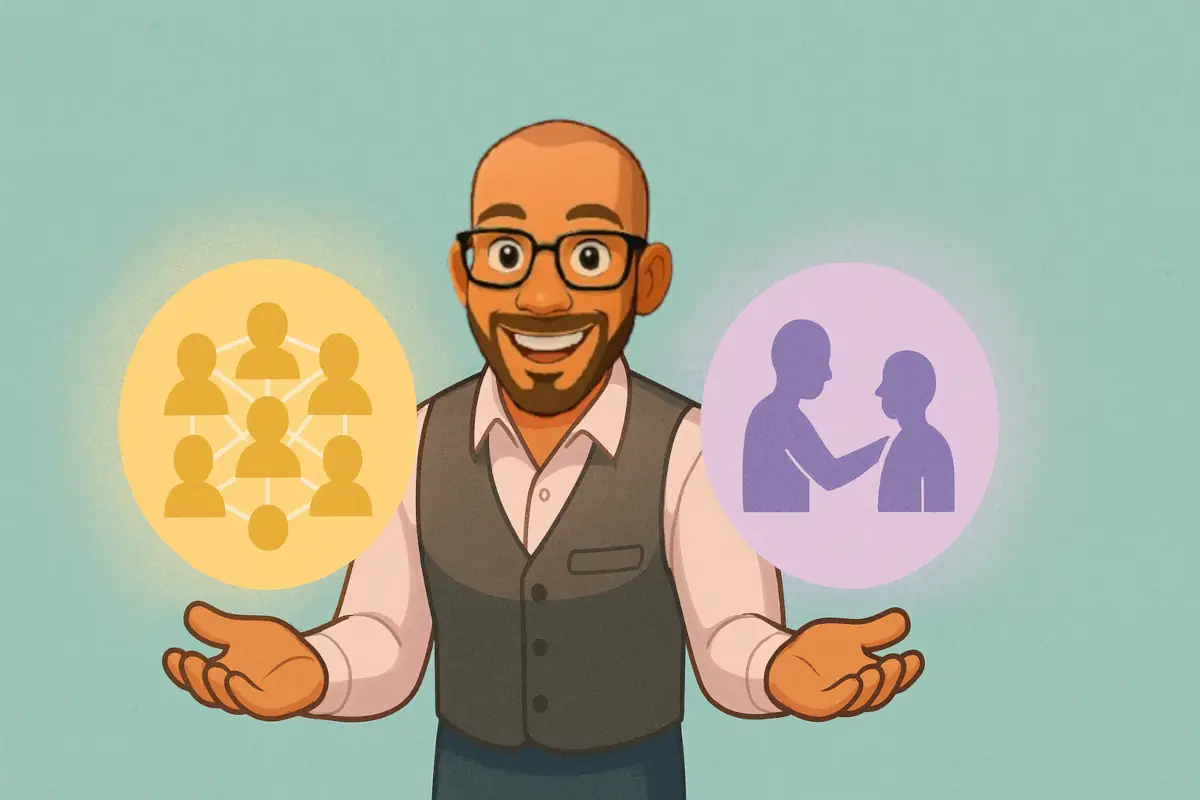Group Tapping vs 1-on-1: The Definitive Guide to Choosing
Navigating the choice of group tapping vs 1-on-1 coaching can feel like standing at a crossroads on your healing journey. Both paths use the powerful tool of EFT (Emotional Freedom Techniques) to create profound change, but they offer vastly different experiences. One path is paved with shared energy and community, while the other offers a private, laser-focused expedition into your inner world.
To start a tapping session with E.M.O. and experience how just one session can shift how you feel about an issue, simply click the smiley face chat icon at the bottom left of your screen
A Deep Dive into Group Tapping: The Power of Collective Healing
Group tapping sessions bring individuals together, guided by a practitioner, to tap on a common theme—such as anxiety about the future or releasing financial stress. This format is one side of the **group tapping vs 1-on-1** equation, and its magic lies in its shared, resonant energy.
What It Offers:
- Profound Community Support: One of the most significant benefits is the immediate sense of not being alone. In a group, you share the healing process with others who genuinely understand what you’re going through. This shared vulnerability fosters a powerful bond and a safe space to be seen and accepted.
- The Phenomenon of “Borrowing Benefits”: This is a cornerstone of group EFT. Even when you’re tapping along with someone else as they voice their specific issue, you often experience emotional or physical relief for your own problems. Our nervous systems are interconnected, and as one person finds release, it creates a ripple effect through the group.
- Connection and Normalization: Hearing others share stories that echo your own struggles is incredibly validating. It normalizes your experience, dispels feelings of isolation, and reinforces the truth that you are not broken. This acceptance is, in itself, a powerful healing agent. –
- Affordability & Accessibility: Because the practitioner’s time is shared, group sessions are significantly more cost-effective than private coaching. This accessibility makes it possible to engage in regular healing work without a substantial financial investment, creating consistent momentum.
Who It’s Best For:
- Individuals seeking connection and the uplifting energy of a shared healing space.
- Those working on general life stressors, common anxieties, or motivational blocks.
- People who learn well by observing others and benefit from the “Borrowing Benefits” effect.
- Anyone looking for an affordable and consistent way to maintain their emotional well-being.
The Case for 1-on-1 Coaching: Deeply Personalized Transformation
On the other side of the **group tapping vs 1-on-1** spectrum, one-on-one coaching is a completely different modality. It is a deeply personal, confidential, and customized container designed to address the specific roots of your individual challenges. Here, the entire session is tailored to you.
What It Offers:
- Completely Customized Healing: Your practitioner can laser-focus on your core issues, past events, and limiting beliefs. Every tapping round, every question, and every insight is dedicated to unraveling your unique patterns, leading to faster and more direct breakthroughs.
- A Safe, Confidential Sanctuary: For those dealing with significant trauma, deeply personal issues, or anything you’re not ready to share publicly, the privacy of 1-on-1 coaching is essential. It provides a secure space to explore complex emotions without fear of judgment.
- Expert Guidance Through Plateaus: A skilled practitioner can identify subconscious blocks or “secondary gains” (hidden reasons for staying stuck) that are difficult to see on your own or in a group setting. They guide you through these challenging moments that might otherwise halt your progress.
- Flexible and Adaptive Pacing: The session moves entirely at your pace. If a particular memory needs more time and gentle processing, you have the space for it. If you have a sudden breakthrough, the session can pivot to integrate that new awareness. This flexibility is key to deep, sustainable healing.
The efficacy of this focused approach is backed by research. Studies published on resources like PubMed Central have demonstrated EFT’s effectiveness for conditions like PTSD, where a personalized, trauma-informed approach is paramount.
Who It’s Best For:
- Those with specific, deep-seated issues like trauma, chronic pain, or persistent phobias.
- Individuals who value absolute privacy and confidentiality in their healing work.
- Anyone feeling “stuck” and seeking rapid, tailored results to break through a plateau.
- People who want to integrate EFT with other therapeutic modalities for a comprehensive approach.
Comparison at a Glance: Group Tapping vs 1-on-1
| Factor | Group Tapping | 1-on-1 Coaching |
|---|---|---|
| Cost | More affordable, lower investment | Higher investment, premium service |
| Focus | General themes, shared issues | Your specific needs, root causes |
| Pacing | Follows the group rhythm and schedule | Completely adapted to your personal pace |
| Support | Peer community and shared energy | Undivided expert attention and guidance |
| Privacy | Public within the group context | Completely confidential and private |
| Best For | General well-being, connection, maintenance | Deep trauma, specific goals, breakthroughs |
How to Decide Which Path Is Right for You
Making your choice in the group tapping vs 1-on-1 debate ultimately comes down to personal reflection. To find clarity, ask yourself these key questions about the **group tapping vs 1-on-1** choice:
- What is my primary goal right now? Am I looking for general stress relief and a sense of community, or do I need to tackle a specific, painful issue from my past?
- What is my comfort level with sharing? Do I feel energized by sharing with others, or do I need complete privacy to feel safe enough to open up?
- What is my budget for healing work? Am I seeking a low-cost, consistent practice, or am I ready to make a focused investment in rapid, deep transformation?
- How much support do I need? Does the idea of peer support feel sufficient, or do I need the undivided attention of a guide to navigate my inner landscape?
The Hybrid Approach: The Best of Both Worlds
It’s important to remember that the **group tapping vs 1-on-1** question isn’t always an “either/or” choice. Many people find incredible value in a hybrid approach. You might use 1-on-1 coaching to work through a core trauma or a major life transition, and then join a weekly group tapping circle for ongoing maintenance, community connection, and emotional regulation. This strategy allows you to get the deep, targeted work you need while also enjoying the affordable, consistent support of a group.
Your Journey, Your Choice
Ultimately, whether you choose the communal energy of group tapping or the focused intimacy of 1-on-1 coaching, you are taking a courageous step. The group tapping vs 1-on-1 choice is simply about finding the right vehicle for your journey. Trust your intuition, consider your practical needs, and know that whatever path you choose, what matters most is your commitment to showing up for yourself.



